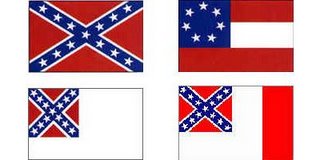On Barring the Stars and Bars

Historian John Steele Gordon responds to Hillary Clinton's call to remove (purge?) the Confederate flag from the South Carolina capitol grounds:
What everyone — except serious historians of the Confederacy and vexillologists — thinks of as "the Confederate flag" in fact is no such thing. It is the battle flag. And, as far as I'm concerned, it is ruined as a symbol by its post–Civil War associations, just as no one can look at a swastika — a design of great antiquity — without thinking of the Nazis.
So why not fly the national flag of the Confederacy instead? From above:
Top left: The Confederate battle flag.
Top right: The first flag of the Confederacy.
Bottom left: The second flag of the Confederacy.
Bottom right: The third flag of the Confederacy.
The stars and bars [top right] would certainly serve as a memorial to those who fought under it and its successors, but it is free of the stain of twentieth-century racism. Most people, I fancy, seeing it flying from a pole on the capitol grounds in Columbia would have no idea what it was and go on about their business. But those who cared most certainly would recognize it as an honorable emblem of their ancestors' "blood-bought immortality."
Two hasty stitches:
--Why should policies cater to people who "have no idea" about the policy itself? Since when do historians embrace the politics of "Ha ha, I know a secret!" and favor accommodating the ignorant? Since when is the goal of a debate to placate those who have no understanding of what you're debating in the first place?
--Either way, I think Gordon has it exactly backwards. If we are going to engage in the Civil War version of "support the troops but not the war" politics, then let's at least be historically accurate about it — by embracing the Confederate battle flag at the expense of the "Stars and Bars."
If the typical Confederate foot soldier owned no slaves and cared little about abstract notions of secession, federalism and "states powers," but simply felt a (patriotic) duty to defend his homeland, then why sully that "forgotten honor" by embracing the flag, not of the Confederate soldier, but of the Confederate politician — the very same politician who ruined, or cost him, his life — for interests that were not even his to begin with?
"So as not to confuse the uneducated" is not a legitimate answer. Either educate them or unconditionally surrender to them and have no antebellum emblems whatsoever (which seems to be the prevailing view anyway). In which case the issue really will devolve down to "Ha ha, I know a secret."

0 Comments:
Post a Comment
<< Home